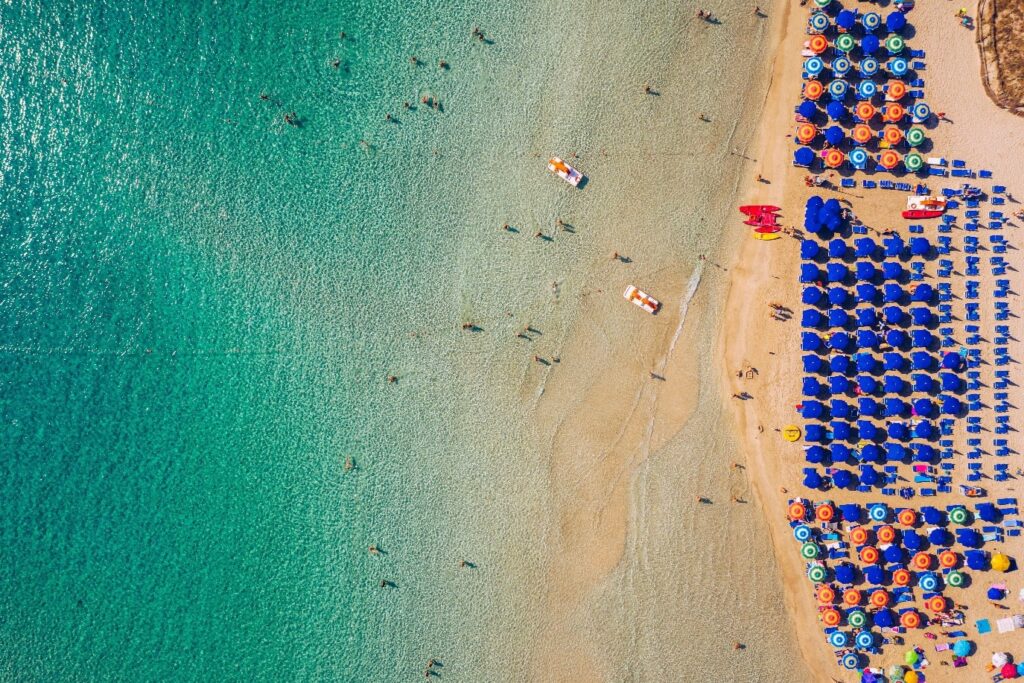Tourists
I am on holiday at the moment. And although I didn’t quite write this on the beach, I thought about it on the beach. If you didn’t know I loved you before, you know now.

Technology will not just be a part of our lives forever, but it will keep changing and it will always require our attention
You rascals.
And one of the things you can’t escape while in Greece in summer is tourists. So I have been reflecting on tourists. Not so much the cameras and sandals and irredeemable visors, but the fact that the term is almost always derogatory. Tourists are to be distinguished from world travellers and adventurers. Tourists are perceived as superficial in their engagements with what is around them. They come, they buy miniature Eiffel Towers and bottles of Ouzo shaped like an Ionian column, they stay on the beaten track, they go.
In so many ways, they are the symbol of an era.
They sample history, culture, weather, local customs and scenery in snack-sized bites. They pay for the privilege. They acquire proof that they petted the local fauna and ate a funny pie in the form of photos, souvenirs and t-shirts from the local tourist shop. And then they go home. They look but they rarely touch.
A little bit like how our industry has engaged with technology and digital ways of working in the past 15 years.
We wandered around a bit, spent some money, wrote some press releases, did some digital foraging… we created ESG checklists and held hackathons. We built innovation centres and invested. We hired designers and changed the wallpaper.
We spent money on horizon-scanning reports and managed transitions.
But. We did all this in the context of the all-hallowed BAU.
Tourists of our own era.
What more can anyone ask of us? We came, didn’t we? To this foreign country with its new technology and new risk models, new ways of working and impossibly high standards of access, equity, fairness and inclusion. Treating humans fairly. Treating the planet fairly.
Nobody said no to any of this. It’s just that… we don’t live here. Like the tourists I see on my local beach. They like it here. But they are not considering moving.
They wander in and exclaim how gorgeous and different everything is. They spend some time. They spend some money. With any luck they learn something.
But they were never staying.
Their BAU is back where they came from.
And that works fine as far as visiting places goes. It works less well as far as visiting eras goes. And our industry has been treating the digital era like a foreign country. We will visit, but we won’t drink the water.
It’s not a happy thought, this.
But thankfully, sitting on a beach, you don’t just see tourists. You also see kids. A lot of kids. Shrieking and hurling themselves at the water. Screaming ‘I think I caught a baby crab’ in 17 different languages in a space between horror and delight. They build sandcastles with faces sticky with ice cream. They throw their ball too hard. They play their music too loud.
Some are going back to school in a week or so.
And some have graduated, shiny like new pennies, and they are about to join your company.
Every year, roundabout this time, a handful of bright young faces will walk into your office.
You may not even see them.
You may joke how the youngsters keep getting younger.
You may lament how they are always on their phones, more likely to take a mental health day than stay burning the midnight oil like you would have done ‘in your day’. You may think they are a bit woke and you can’t say anything around them for fear of causing offence. Rarely thinking whether the thing you were about to say is actually offensive and they are right not to let you get away with it the way our generation would have done because we didn’t always have the guts to speak up when people with age and authority said or did unsavoury things.
I don’t have kids and I don’t presume to know much about young people. But I know this:
The younger the person I interview for a role, the more likely they are to ask about our company’s carbon footprint, gender and racial diversity, accessibility and disability awareness commitments.
The younger the person I interview, the more likely they are to actually care about things we, as an industry, have long treated as a tick-box exercise.
The younger the person I speak to, the more likely they are to realise that they are part of a whole. That climate change and poverty are not separate conversations. That we all win or lose together.
And they seem to accept that technology will not just be a part of our lives forever – we have known this since the 70s after all – but that it will keep changing and it will always require our attention. We will need to keep learning, keep understanding, keep reflecting. They know instinctively that this work will never be done.
Those kids are not tourists, is what I’m trying to say. They know they live here. They know they have to engage past souvenirs and holiday snaps, past projects and investments. If the water isn’t safe to drink, that’s not a data point. It’s a thing we have to fix, since we live here.
And many of these kids are not kids any more.
A few weeks back, we had an extended family BBQ. The youngest person there was 17, oldest was 78, and the group was big enough that the age gaps between individuals was never more than five years. You should try intergenerational coexistence, by the way, even if it is alien to you culturally. It’s good for everyone.
So one of the youngsters went and sat with my dad.
And he asked him about how the world has changed in his lifetime. “You are the oldest person here,” he said, with immense respect. “What have you seen in this time? How have things changed? Talk to me.”
They chatted about technology, and society, and interpersonal relationships.
They chatted about what has been constant and what looked like it would have been constant and yet was not.
He asked and he listened.
And I was humbled because, frankly, it has never occurred to me to do that, and I think of myself as the thoughtful sort. And yet this, right there, was a thought I never had. And what a thought it was.
He wanted to hear about the past from someone who had lived through it. He believed there was value in reaching out and sitting still to listen.
I don’t know what he will do with that information.
What I do know is that he is not a tourist. And I also know not everyone in this generation will be this thoughtful, of course. I know that.
But they are not tourists in pretty large numbers.
They know they live here. In the society, climate and economy we have bequeathed. They didn’t choose to move here, you realise. They just don’t delude themselves.
They live here. In this time and place.
And they know it.
And some even know how to reach out for knowledge and understanding wherever that may be.
Just listening to that young man talk to my dad, I thought the kids are alright. And thanks to them, we may be too.
#LedaWrites

Leda Glyptis is FinTech Futures’ resident thought provocateur – she leads, writes on, lives and breathes transformation and digital disruption.
She is a recovering banker, lapsed academic and long-term resident of the banking ecosystem.
Leda is also a published author – her first book, Bankers Like Us: Dispatches from an Industry in Transition, is available to order here.
All opinions are her own. You can’t have them – but you are welcome to debate and comment!
Follow Leda on Twitter @LedaGlyptis and LinkedIn.










































Thanks, you reminded me of something my grandmother said. Yesterday was the 40th anniversary of her death (83), but I remember her reflecting on the change in her lifetime. She remembered when horses were the main form of transportation yet had seen a man walk on the moon. Laterly, her main excitement was the “silicon chip” (Dundee manufactured Sinclair home computers).
If things are moving too fast for some now, consider the rate of change in her lifetime (house price increased 5 fold from 1967 to 1985, but that’s another story).